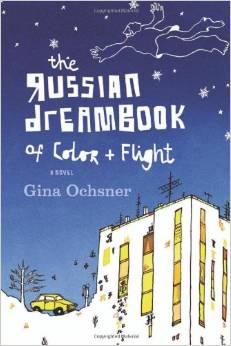 The Russian Dreambook of Colour and Flight
The Russian Dreambook of Colour and Flight
This beautifully titled book is not for everyone, but it speaks to me. My day to day life may not be exciting, but at night I travel to other continents. My one complaint is that about once a month, I find myself just finishing a lovely trip in my dreams to some new, exotic place only to remember that I have a ticket for China and I’m neither packed, prepared, nor pleased. Perhaps because after visiting China in summer of 1982 when skies were blue, shirts were blue and cars were few, I’ve had my fill of that experience. I must say that our watchers in China were far more gracious and useful frequently returning lost objects to me, like my camera, compared to the Soviet followers lurking in the shadows who may have awaited my droppings for personal re-sale.
“…as a girl, she’d [Olga] collected languages the same way people collected keys or buttons. At night she dreamt in other languages and she woke in the morning with spoonfuls of those foreign sounds still on her tongue.."
Our book, Jewish Luck, is a true story about two very extraordinary and fortunate women in the magical city of Leningrad/St. Petersburg. The Russian Dreambook, though nonfiction, reads like a truer story about four ordinary women of different ethnic origins who share bad luck and apartments in the same tenement in Perm, on the edge of Siberia. Yet, they are all dreamers; and, in the end, at least for two of them, their modest dreams come true.
How unlucky are these women? Don’t ask. One woman, Azad, daughter of a Muslim historian who was forcibly moved to Perm, ekes out a living by attending to the one toilet on the roof. By the smell, she senses everone’s mood. Azad has other waste to dispose of including her husband’s ghost and her adopted son who has matured into a raging sociopath. The other three have dreams. Olga, a Jew, works at the newspaper translating trivial stories according to the rigid guidebook on appropriate Russian phrases and topics. She is our first narrator who recounts the absurdities of life at The Red Star and eventually is compelled to leave the paper “when the ink runs out.”
Reminiscent of the few stories written by women in Soviet times, Ochsner recounts the pain of simply surviving and the deep loneliness of a loveless life. Women carried on the work of Russia making stone soup, while the men who returned from war drank away their kopecks. Tanya, the most ambitious, works at the All-Russian All-Cosmopolitan Museum of Art, Geology and Anthropology where all the dusty exhibits are mediocre replicas. Perhaps having a Russian Orthodox grandmother inspired Tanya to create icons of her own out of chewing gum, cardboard and gum foil, which are on display there. She expresses herself better in poetry as she colors in the black and white Russian life with her words.
Anticipation builds with the upcoming visit of representatives from “The Americans of Russian Extraction for the Causes of Beautification,” who want to experience the real Perm, including a homestay with Tanya. Tanya is petrified. She is not counting on their funding the museum as she has plans to become an Aeroflot stewardess if only she can lose some weight. This brings us to the last woman, Zoya, who is counting on the museum grant to siphon into her own pocket in order to raise a child with Olga’s shell-shocked son.
This is a tight, well-written, bittersweet book but it tells a story that not everyone want to read. For me, there is humor and resilience in these women, especially Tanya and Olga, even though their lives are horrible in most every way.
My favorite line was set up by an American visitor noting that Tanya’s grandmother appeared to be mentally ill asking, “Why don’t you take her to the hospital?”
“Unthinkable,” Tanya said, “She’d never make it. One has to be extraordinarily healthy to survive a stay in a Russian hospital.” Our readers will understand that well.
I have not read The Master and Margarita in 40 years; but there are elements in The Russian Dreambook of Colour and Flight that echo for me the magical realism, the absurdity and the resilience of hope even among the Russian dead, and those who lead an impoverished life who are nearly dead, hoping for resurrection.